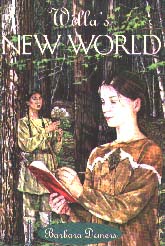|
________________
CM . . . .
Volume VI Number 14 . . . . March 17, 2000
excerpt: The bitter, dark cold stayed for long, barely endurable months. The sun disappeared for longer and longer periods. Our movements were so severely restricted because of the unbearable cold, storms, and blizzarding gales that it became urgent to find something - anything - to do. The men played cards, drank, and fought. Or they would lie motionless, staring into space, until the cold forced them to move about.Aptly titled, this novel follows 15-year-old Willa Thompson as she struggles to understand and survive in the harsh environment of 18th century northern Manitoba. The story begins in London, England, where Willa, a young lady from a well-to-do family, suddenly finds herself a penniless orphan. But, before she has a chance to adjust to that shock, she is thrust unceremoniously upon a ship bound for York Factory on Hudson Bay, by her great uncle who, for reasons not disclosed, clearly wants to get rid of her. Willa survives the long sea voyage, but she is no sooner off the ship than she is set upon by Digger and Dyer, an unscrupulous pair of thugs whose sole interest in her is to work her as a slave until she dies. As York Factory is the only community in the otherwise barren wilderness, it is inevitable that Willa will eventually find herself there, and when she does, she seizes the opportunity to escape her captors. Through her quick wits, Willa acquires a protector and employer in Master George, the fort's presiding HBC representative and leading citizen. Willa also finds a friend in Amelia, a talented and insightful young native woman who works as the fort's cook. With time and the help of these people, Willa adjusts to and even begins to like her new life. But when she declines Master George's unexpected marriage proposal, the situation between the two becomes tense, and Willa finds herself once more on the move - "transferred" to Fort Edmonton, 1500 kilometres away. She is escorted there on foot by Amelia's mother, brother, and cousin, and it is during this lengthy journey that Willa learns to appreciate fully the beauty of her "new world" and the people who inhabit it. Willa's New World is primarily a story of setting, and Demers does an excellent job of painting the bleak, unforgiving landscape of northern Manitoba, as well as recreating the unbearable living conditions found in forts such as York Factory. However, much of this information, particularly in the first hundred pages, is provided through direct explanation by Amelia and Master George, a technique which tends to slow the story's action. Indeed, the plot is most often reported after-the-fact, almost as an afterthought, rather than the basis for the story. And though Willa narrates her own tale, she does so from a distance so that her emotions and innermost thoughts are seldom revealed. Consequently, even though she is the central character, readers feel little more affinity for her at the end of the novel than they did at the beginning. Nevertheless, the novel offers an interesting and palatable means of learning about an important period in Canadian history. It would make a worthy reading companion for those studying the expansion of the fur trade into Western Canada. Recommended. Kristin Butcher lives in Victoria, BC, and writes books for children.
To comment on this title or this review, send mail to cm@umanitoba.ca.
Copyright © the Manitoba Library Association.
Reproduction for personal use is permitted only if this copyright notice
is maintained. Any other reproduction is prohibited without
permission.
Published by
TABLE OF CONTENTS FOR THIS ISSUE - March 17, 2000.
AUTHORS |
TITLES |
MEDIA REVIEWS |
PROFILES |
BACK ISSUES |
SEARCH |
CMARCHIVE |
HOME
|
